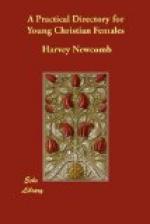and customs, and to see the practical application
of the principles he advances. 3. Consider the
principal scope or aim of the book; or, what was the
author’s object, design, or intention, in writing
it. Notice also the general plan or method which
he has pursued. This will enable you to discover
his leading ideas, if it be an argumentative work;
or the particular instructions of God’s providence,
if it be historical. 4. Where the language is
difficult to be understood, pay strict attention to
the context, and you will generally find the author’s
meaning explained. But, if you do not, consider
whether the difficult phrase is a peculiarity of the
writer’s style. If so, look out the place
where he has used it in a different connection, and
see what meaning is attached to it there. But,
if this does not satisfy you, examine the passages,
in other parts of the Scriptures, which relate to
the same subject, and compare them with the one under
consideration. This will generally clear up the
darkest passages. But, if you still feel in doubt,
you may find assistance from consulting commentators,
who have made themselves thoroughly acquainted with
all the particulars I have mentioned; which, with
a knowledge of the language in which the book was originally
written, may have enabled them to remove the difficulty.
But, do not trust the opinions of commentators any
farther than you see they agree with the general system
of revealed truth; and, above all, do not follow them
in any scheme of fanciful interpretation or visionary
speculation.
(3.) Do not task yourself with a certain quantity
of reading at the regular seasons devoted to the study
of the Bible. This may lead you to hurry over
it, without ascertaining its meaning, or drinking in
its spirit. You had better study one verse thoroughly,
than to read half a dozen chapters carelessly.
The nourishment received from food depends less on
the quantity than on its being perfectly digested.
So with the mind; one clear idea is better than a
dozen confused ones; and there is such a thing as
overloading the mind with undigested knowledge.
Ponder upon every portion you read, until you get
a full and clear view of the truth it contains.
Fix your mind and heart upon it, as the bee lights
upon the flower; and do not leave it till you have
extracted all the honey it contains.
(4.) Read in course. By studying the whole Bible
in connection, you will obtain a more enlarged view
of the plan of God’s moral government. And
you will see how it all centres in the Lord Jesus Christ.
But I would not have you confine yourself entirely
to the regular reading of the whole Bible in course.
Some portions of the historical part do not require
so much study as that which is more argumentative
and doctrinal; and some parts of the word of God are
more devotional than others, and therefore better
fitted for daily practical use. A very good plan
is, to read the Old and New Testaments in course, a




